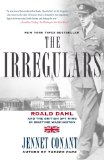Summary | Excerpt | Reviews | Beyond the Book | Readalikes | Genres & Themes | Author Bio

Roald Dahl and the British Spy Ring in Wartime Washington
by Jennet Conant
Nothing if not grandiose, Marsh enjoyed the role of benefactor and liked to collect around him bright young men who caught his fancy. In the course of his publishing career, he had mentored a series of talented editors and writers, as well as a number of rising political stars. "Charles always had a group of young men around him, and Roald was one of them," said Fath, who numbered among Marsh's acolytes. "Roald always wore his uniform, and was very attractive and interesting, and had a rack of good stories from his years in the RAF. He was a genuine war hero, shot down and decorated, and at the same time very educated and articulate, so he was very impressive." Ingersoll, like Fath, could not help noticing how comfortable the British pilot seemed in the powerful publisher's midst, casually stretched out on the sofa with his long legs resting on the coffee table, and attributed it to "his wit and a kind of cocky British grace [that was] instantly engaging."
By the end of 1942, Dahl had become an integral part of Marsh's large, eccentric R Street household. "We all just adored him, especially my father," recalled Antoinette Marsh Haskell, who at twenty-eight was the oldest of the Marsh offspring. Along with her husband, Robert Haskell, and two brothers, Charles Jr. and John, Antoinette tried to make the lonely serviceman feel at home and invited him on weekend outings, to parties and holiday dinners. "We sort of adopted him," said Antoinette. "Roald was a real charmer when he wanted to be. He was great fun to be around. He was always doing tricks and playing crazy practical jokes, probably to cut the tension, because it was a very tense time in the world."
For Dahl, who missed his mother and sisters, the Marshes became a second family. The R Street house was his refuge. It was a place of comfort and fellowship, particularly that somber Christmas of 1942 -- the second since Pearl Harbor -- when Dahl could have easily become engulfed in the melancholy that hung over the capital's crowded boardinghouses and the hordes of displaced servicemen and war workers. Instead, he was invited to share the Marshes' holiday feast and to admire the giant evergreen that Charles had managed to obtain despite the reported shortages caused by the lack of manpower and transportation. The tree was every bit as colossal and fabulous as its owner, and its glittering lights cheered all those in its presence, a gaudy beacon of hope amid all the uncertainty.
Fatherless from a young age, Dahl admired Charles Marsh more than any man he had ever met, and he became increasingly dependent on his advice and good opinion. Marsh was warm and generous, with an irrepressible confidence in himself and the future that exasperated his enemies and won him enduring friendships throughout his life. He was famously impulsive and dished out expensive gifts and treats for faithful colleagues without waiting for a reason or occasion. Once, when a guest admired a painting, he promptly took it off the wall and insisted she keep it as a gift. Having given himself permission to enjoy an unchecked existence, both materially and emotionally, he encouraged his young protégé to follow his example. He was an enthusiastic proponent of plunging into life with both feet, committing oneself fully, damn the consequences. He championed a sort of super-American, Whitmanesque belief in pure spirit, boundless possibility, and what he called that unshakable "bit of divine moving from the embryo to death in each of us."
It was to Marsh that Dahl increasingly turned when he wanted to escape the petty demands of embassy life, and the petty officials who were always wringing their hands over his latest remark or ill-advised stunt. Never one to follow the rules, be it at school or at the embassy, Dahl was always getting up to some kind of mischief, whether it was filching expensive cigars from his boss's office and passing them around, or sending self-aggrandizing missives to Marsh written on the thick, buff-colored British Embassy stationery and carrying the official red wax seal. His favorite pastime was lampooning the mannered style of his country's wartime representatives, particularly that of the British ambassador, the first Earl of Halifax, an old Etonian who even his erudite information officer, Isaiah Berlin, an Oxford philosopher, described as "being not of this century."
Copyright © 2008 by Jennet Conant
Your guide toexceptional books
BookBrowse seeks out and recommends the best in contemporary fiction and nonfiction—books that not only engage and entertain but also deepen our understanding of ourselves and the world around us.